Quirinus represents a significant yet enigmatic figure in ancient Roman worship, associated closely with the origins and identity of the city. Known from the earliest eras alongside deities such as Jupiter and Mars, Quirinus is intrinsically linked to the Quirinal Hill, a site believed to symbolize the safeguarding of the Roman populace and the foundational myth of Rome.
The Roots of Quirinus
Quirinus derives his name from the Quirinal Hill, which was incorporated into Rome at a later date, originally being inhabited by non-Roman tribes, likely the Sabines according to historical accounts including those of Ovid. Some believe that Quirinus emerged as a local deity for these people, possibly a war god, with his name closely related to the Sabine word for spear, “curis.” Additional interpretations suggest his designation stems from “couirium,” referring to an “assembly of men,” reflective of the early community on the hill.
Quirinus’ Connection to Romulus
Ovid notes an important link between Quirinus and the legendary founder of Rome, Romulus. Following Romulus’s death, Jupiter deemed him divine, revealing himself to the Roman citizens as Quirinus. This divine identity was marked by a directive for the people to erect temples and honor him on the hill that bore his name, solidifying Quirinus’s association with the city’s origins.
Quirinus Within the Divine Triad
After the Quirinal Hill’s incorporation into Rome’s territory, Quirinus assumed the status of a Roman god, forming part of the early divine triad alongside Jupiter and Mars. Among these deities, Quirinus held the lowest prestige; he was served by the Flamen Quirinalis, who ranked beneath the other two Flamen Maiores. Additionally, he was the last to receive the spoils of triumph offered by victorious generals.
Originally a war deity of the Sabines, Quirinus’s warrior attributes diminished; by the time of Roman adoption, his persona had shifted towards a protective figure, contrasting with Mars, who remained the embodiment of martial valor. Quirinus’s sacred artifacts, unlike Mars’s, were kept in a temple coated in pitch, illustrating their dormant state as opposed to active warfare.
Festivals and Devotion to Quirinus
The precise functions and significance of Quirinus in Roman religious practice can be elusive. However, his protective role for the Roman populace was highlighted during various celebrations. His priests participated in festivals like the Consualia, Robigalia, and Fornacalia—rituals centered on grain cultivation and preservation—underscoring Quirinus’s importance in sustaining the agricultural prosperity of Rome.
Georges Dumézil posits that Quirinus’s name indicates he does not merely symbolize residents of the Quirinal Hill but represents a collective assembly of the Roman citizenry at large.
References
The connections between Quirinus, Romulus, and early Roman religion are drawn from foundational texts and analyses of antiquity, including the writings of Ovid and contemporary scholarly works offering insight into the importance of this deity in the shaping of Roman identity.



